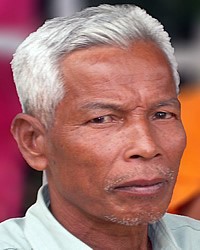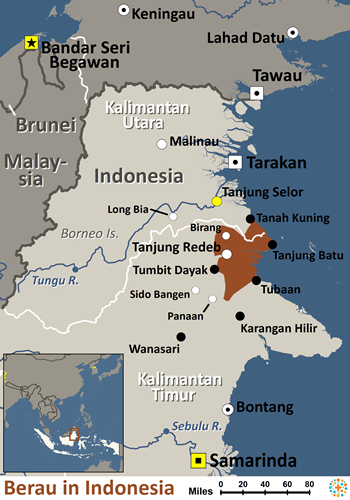The Berau live in many small villages in the Berau regency of East Kalimantan. The Berau speak their own language, which differentiates them from other ethnic groups in East Kalimantan.
In the past, the Berau had class distinctions, but these have faded in modern times. Today, wealth and formal education are determiners of one's social status. The richer a person is or the higher a person's formal education, the higher their social standing.
In general, the Berau prefer to live in groups near rivers in wooden raised platform houses. Their houses are close together, like in the city, even though there is plenty of land where they live. They have a clear separation between living areas and fields. Like the Melayu, the Berau in general are friendly and follow the Islamic faith.
The Berau mainly make their living as either farmers or fishermen. The farmers grow sweet potatoes, cassava, lentils, fruits and vegetables. Like other Kalimantan ethnic groups in general, the Berau practice migratory agriculture (shifting from one field to another) mainly because they cannot maintain the soil's fertility. New farmland is opened by cutting down trees and burning the underbrush. The initial clearing of a field is accomplished with the help of a large group of neighbors. This farming method is often accused of being the main cause of forest fires in Kalimantan. Even though their actions do cause damage, it is not comparable to the destruction done by businessmen who hold "Forest Enterprise Rights" from the government. Some Berau living in cities work for government or private businesses. Others work as craftsmen or day laborers. The Berau also produce a handicraft of specially woven fabric, which they often sell to outsiders. A new form of income that has developed recently is the presenting of their traditional ceremonies as a tourist attraction.
Most of the Berau follow the patrilineal kinship system (tracing descent from the father). Male superiority and dominance is seen in every aspect of life. The men determine issues concerning marriage and inheritance.
Today most Berau identify themselves as Muslims. However, many Berau people still believe in animism, believing that spirits are in all places and influence mankind. Thus, traditional Berau rituals and ceremonies focus on seeking protection through magic by either appeasing or controlling both good and bad spirits. A shaman plays an important role in Berau society and is often asked to use spells to heal sicknesses or initiate other favorable results in people's lives.
Since the Berau are nomadic, most of them do not have opportunities for a formal education. Typically, only those who are settled receive a formal education. The areas where the Berau live are rich in mining resources, such as gold, coal, lead, zinc, petroleum and natural gas. These areas also have forestry products like rattan, resin and wood. Unfortunately, the abundant natural resources have not been managed optimally, so they do not provide the Berau with a better life. For this reason, better management efforts are needed to improve their human resources and help them become self-sufficient.
Pray for a spiritual openness among the Barau that will lead them to the cross and the empty grave. May they rejoice in Christ's resurrection victory!
Pray for loving workers in Barau communities.
Pray for Barau disciples to make more disciples.
Scripture Prayers for the Berau in Indonesia.
IPN, 2011 Copyrighted © Used with permission
| Profile Source: Joshua Project |

























